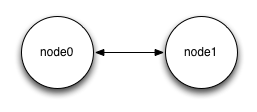| This document is derived from an original post by Tim Dysinger. However, the examples here are for nng instead of nanomsg. For the legacy nanomsg version of this, see Getting Started with 'nanomsg'. |
Request/Reply (I ask, you answer)

Request/Reply is used for synchronous communications where each question is responded with a single answer, for example remote procedure calls (RPCs). Like Pipeline, it also can perform load-balancing. This is the only reliable messaging pattern in the suite, as it automatically will retry if a request is not matched with a response.
reqprep.c
#include <stdlib.h>
#include <stdio.h>
#include <string.h>
#include <time.h>
#include <nng/nng.h>
#include <nng/protocol/reqrep0/rep.h>
#include <nng/protocol/reqrep0/req.h>
#define NODE0 "node0"
#define NODE1 "node1"
#define DATE "DATE"
void
fatal(const char *func, int rv)
{
fprintf(stderr, "%s: %s\n", func, nng_strerror(rv));
exit(1);
}
char *
date(void)
{
time_t now = time(&now);
struct tm *info = localtime(&now);
char *text = asctime(info);
text[strlen(text)-1] = '\0'; // remove '\n'
return (text);
}
int
node0(const char *url)
{
nng_socket sock;
int rv;
if ((rv = nng_rep0_open(&sock)) != 0) {
fatal("nng_rep0_open", rv);
}
if ((rv = nng_listen(sock, url, NULL, 0)) != 0) {
fatal("nng_listen", rv);
}
for (;;) {
char *buf = NULL;
size_t sz;
if ((rv = nng_recv(sock, &buf, &sz, NNG_FLAG_ALLOC)) != 0) {
fatal("nng_recv", rv);
}
if ((sz == (strlen(DATE) + 1)) && (strcmp(DATE, buf) == 0)) {
printf("NODE0: RECEIVED DATE REQUEST\n");
char *d = date();
printf("NODE0: SENDING DATE %s\n", d);
if ((rv = nng_send(sock, d, strlen(d) + 1, 0)) != 0) {
fatal("nng_send", rv);
}
}
nng_free(buf, sz);
}
}
int
node1(const char *url)
{
nng_socket sock;
int rv;
size_t sz;
char *buf = NULL;
if ((rv = nng_req0_open(&sock)) != 0) {
fatal("nng_socket", rv);
}
if ((rv = nng_dial(sock, url, NULL, 0)) != 0) {
fatal("nng_dial", rv);
}
printf("NODE1: SENDING DATE REQUEST %s\n", DATE);
if ((rv = nng_send(sock, DATE, strlen(DATE)+1, 0)) != 0) {
fatal("nng_send", rv);
}
if ((rv = nng_recv(sock, &buf, &sz, NNG_FLAG_ALLOC)) != 0) {
fatal("nng_recv", rv);
}
printf("NODE1: RECEIVED DATE %s\n", buf); (1)
nng_free(buf, sz);
nng_close(sock);
return (0);
}
int
main(const int argc, const char **argv)
{
if ((argc > 1) && (strcmp(NODE0, argv[1]) == 0))
return (node0(argv[2]));
if ((argc > 1) && (strcmp(NODE1, argv[1]) == 0))
return (node1(argv[2]));
fprintf(stderr, "Usage: reqrep %s|%s <URL> ...\n", NODE0, NODE1);
return (1);
}| 1 | Blithely assumes message is ASCIIZ string. Real code should check it. |
Compilation
gcc reqrep.c -lnng -o reqrepExecution
./reqrep node0 ipc:///tmp/reqrep.ipc & node0=$! && sleep 1
./reqrep node1 ipc:///tmp/reqrep.ipc
kill $node0Output
NODE1: SENDING DATE REQUEST DATE NODE0: RECEIVED DATE REQUEST NODE0: SENDING DATE Tue Jan 9 09:17:02 2018 NODE1: RECEIVED DATE Tue Jan 9 09:17:02 2018
